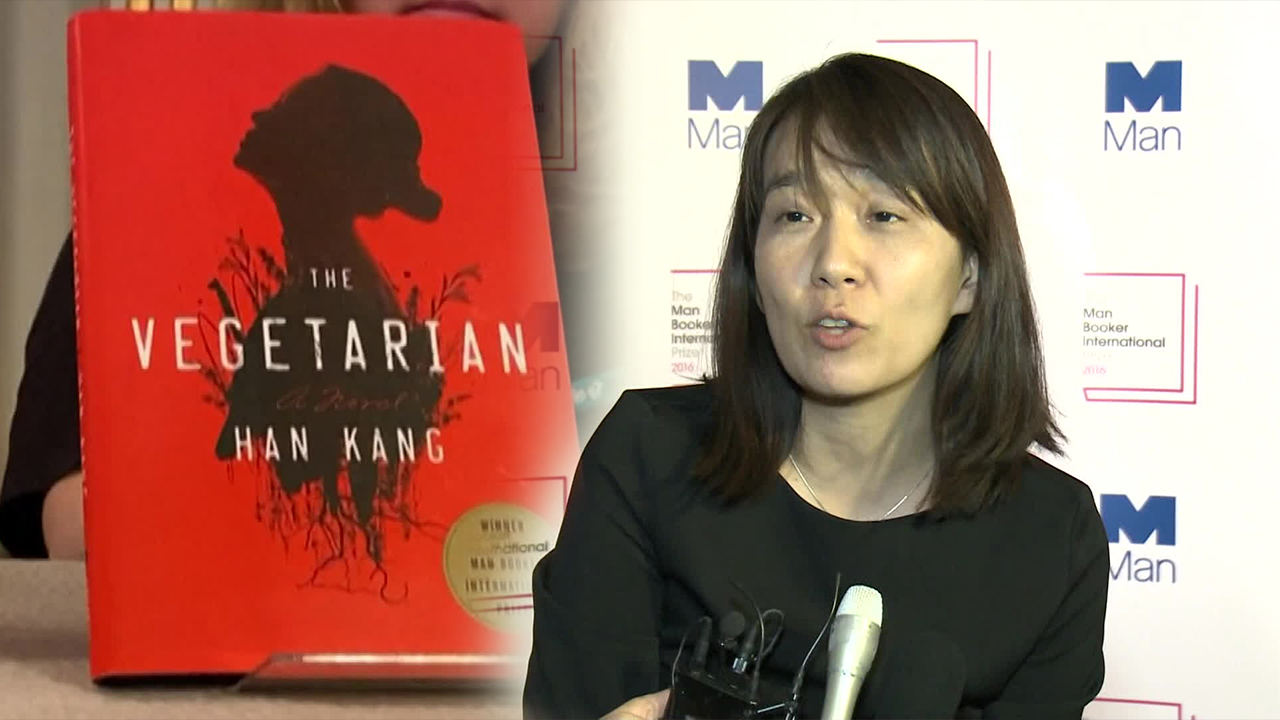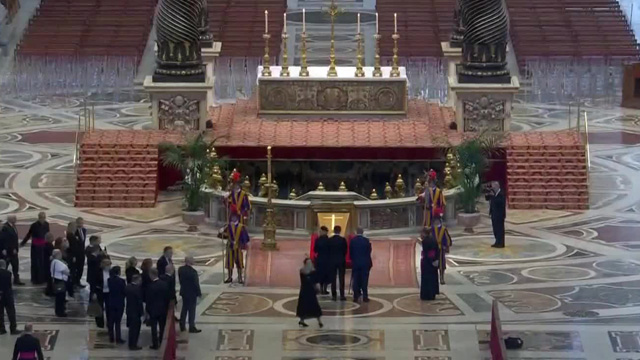Power of translation touted as main contributor behind success of Han Kang
입력 2024.10.12 (00:14)
읽어주기 기능은 크롬기반의
브라우저에서만 사용하실 수 있습니다.
[Anchor]
The role of delicate translation that preserves the original text is being highlighted in the evaluation of Han Kang's Nobel Prize in Literature.
It is analyzed that the translation successfully conveyed the author's emotions beyond language barriers.
How was this possible? Our Paris correspondent, Ahn Da-young, reports.
[Report]
Translation issues have repeatedly hindered Korean authors.
In Han Kang's recent Nobel Prize win, the translation that overcame high barriers is recognized as a hidden contributor.
[Han Kang/Author/After winning the 2016 Man Booker Prize: "I think it’s a great fortune to have met a good translator and a good editor, and I believe that such events will no longer feel unfamiliar in the future."]
The 2016 Man Booker Prize-winning work 'The Vegetarian' became the starting point for introducing Han Kang to the global literary scene.
British translator Deborah Smith, who translated this work, has been praised for her delicate rendering of the author's poetic sentences.
In particular, Smith noted the absence of Korean language specialists in the UK at the time and studied Korean independently, striving to preserve the author's literary sensibility.
[Deborah Smith/Translator of the English version of 'The Vegetarian'/June 2016: "When I read the 'Vegetarian,' I was incredibly impressed by the quality of the writing, by the images that it evoked..."]
Based on the strengthened power of translation, Korean authors are making remarkable strides on the international stage.
In the past three years, Chung Bora's 'Cursed Rabbit', Cheon Myeong-kwan's 'Whale', and Hwang Sok-yong's 'Mater 2-10' have consecutively reached the final candidates for the Man Booker Prize, and Han Kang won the prestigious French literary award, the Medicis Prize, last year, becoming the first Korean to do so.
[Joachim Schnepf/Editor at the French publisher of Han Kang's 'I Do Not Bid Farewell': "A very meticulous process was carried out to convey the language and poetic expressions of Han Kang's writing. There was a lot of work between the publisher and the translator to produce a book as beautiful in French as the original."]
Previously, Chinese author Mo Yan, who won the Nobel Prize in Literature in 2012, stated that sometimes translation is more difficult than creation, and he credited various translators from different countries for his award.
Reporting from Paris, this is Ahn Da-young for KBS News.
The role of delicate translation that preserves the original text is being highlighted in the evaluation of Han Kang's Nobel Prize in Literature.
It is analyzed that the translation successfully conveyed the author's emotions beyond language barriers.
How was this possible? Our Paris correspondent, Ahn Da-young, reports.
[Report]
Translation issues have repeatedly hindered Korean authors.
In Han Kang's recent Nobel Prize win, the translation that overcame high barriers is recognized as a hidden contributor.
[Han Kang/Author/After winning the 2016 Man Booker Prize: "I think it’s a great fortune to have met a good translator and a good editor, and I believe that such events will no longer feel unfamiliar in the future."]
The 2016 Man Booker Prize-winning work 'The Vegetarian' became the starting point for introducing Han Kang to the global literary scene.
British translator Deborah Smith, who translated this work, has been praised for her delicate rendering of the author's poetic sentences.
In particular, Smith noted the absence of Korean language specialists in the UK at the time and studied Korean independently, striving to preserve the author's literary sensibility.
[Deborah Smith/Translator of the English version of 'The Vegetarian'/June 2016: "When I read the 'Vegetarian,' I was incredibly impressed by the quality of the writing, by the images that it evoked..."]
Based on the strengthened power of translation, Korean authors are making remarkable strides on the international stage.
In the past three years, Chung Bora's 'Cursed Rabbit', Cheon Myeong-kwan's 'Whale', and Hwang Sok-yong's 'Mater 2-10' have consecutively reached the final candidates for the Man Booker Prize, and Han Kang won the prestigious French literary award, the Medicis Prize, last year, becoming the first Korean to do so.
[Joachim Schnepf/Editor at the French publisher of Han Kang's 'I Do Not Bid Farewell': "A very meticulous process was carried out to convey the language and poetic expressions of Han Kang's writing. There was a lot of work between the publisher and the translator to produce a book as beautiful in French as the original."]
Previously, Chinese author Mo Yan, who won the Nobel Prize in Literature in 2012, stated that sometimes translation is more difficult than creation, and he credited various translators from different countries for his award.
Reporting from Paris, this is Ahn Da-young for KBS News.
■ 제보하기
▷ 카카오톡 : 'KBS제보' 검색, 채널 추가
▷ 전화 : 02-781-1234, 4444
▷ 이메일 : kbs1234@kbs.co.kr
▷ 유튜브, 네이버, 카카오에서도 KBS뉴스를 구독해주세요!
- Power of translation touted as main contributor behind success of Han Kang
-
- 입력 2024-10-12 00:14:38

[Anchor]
The role of delicate translation that preserves the original text is being highlighted in the evaluation of Han Kang's Nobel Prize in Literature.
It is analyzed that the translation successfully conveyed the author's emotions beyond language barriers.
How was this possible? Our Paris correspondent, Ahn Da-young, reports.
[Report]
Translation issues have repeatedly hindered Korean authors.
In Han Kang's recent Nobel Prize win, the translation that overcame high barriers is recognized as a hidden contributor.
[Han Kang/Author/After winning the 2016 Man Booker Prize: "I think it’s a great fortune to have met a good translator and a good editor, and I believe that such events will no longer feel unfamiliar in the future."]
The 2016 Man Booker Prize-winning work 'The Vegetarian' became the starting point for introducing Han Kang to the global literary scene.
British translator Deborah Smith, who translated this work, has been praised for her delicate rendering of the author's poetic sentences.
In particular, Smith noted the absence of Korean language specialists in the UK at the time and studied Korean independently, striving to preserve the author's literary sensibility.
[Deborah Smith/Translator of the English version of 'The Vegetarian'/June 2016: "When I read the 'Vegetarian,' I was incredibly impressed by the quality of the writing, by the images that it evoked..."]
Based on the strengthened power of translation, Korean authors are making remarkable strides on the international stage.
In the past three years, Chung Bora's 'Cursed Rabbit', Cheon Myeong-kwan's 'Whale', and Hwang Sok-yong's 'Mater 2-10' have consecutively reached the final candidates for the Man Booker Prize, and Han Kang won the prestigious French literary award, the Medicis Prize, last year, becoming the first Korean to do so.
[Joachim Schnepf/Editor at the French publisher of Han Kang's 'I Do Not Bid Farewell': "A very meticulous process was carried out to convey the language and poetic expressions of Han Kang's writing. There was a lot of work between the publisher and the translator to produce a book as beautiful in French as the original."]
Previously, Chinese author Mo Yan, who won the Nobel Prize in Literature in 2012, stated that sometimes translation is more difficult than creation, and he credited various translators from different countries for his award.
Reporting from Paris, this is Ahn Da-young for KBS News.
The role of delicate translation that preserves the original text is being highlighted in the evaluation of Han Kang's Nobel Prize in Literature.
It is analyzed that the translation successfully conveyed the author's emotions beyond language barriers.
How was this possible? Our Paris correspondent, Ahn Da-young, reports.
[Report]
Translation issues have repeatedly hindered Korean authors.
In Han Kang's recent Nobel Prize win, the translation that overcame high barriers is recognized as a hidden contributor.
[Han Kang/Author/After winning the 2016 Man Booker Prize: "I think it’s a great fortune to have met a good translator and a good editor, and I believe that such events will no longer feel unfamiliar in the future."]
The 2016 Man Booker Prize-winning work 'The Vegetarian' became the starting point for introducing Han Kang to the global literary scene.
British translator Deborah Smith, who translated this work, has been praised for her delicate rendering of the author's poetic sentences.
In particular, Smith noted the absence of Korean language specialists in the UK at the time and studied Korean independently, striving to preserve the author's literary sensibility.
[Deborah Smith/Translator of the English version of 'The Vegetarian'/June 2016: "When I read the 'Vegetarian,' I was incredibly impressed by the quality of the writing, by the images that it evoked..."]
Based on the strengthened power of translation, Korean authors are making remarkable strides on the international stage.
In the past three years, Chung Bora's 'Cursed Rabbit', Cheon Myeong-kwan's 'Whale', and Hwang Sok-yong's 'Mater 2-10' have consecutively reached the final candidates for the Man Booker Prize, and Han Kang won the prestigious French literary award, the Medicis Prize, last year, becoming the first Korean to do so.
[Joachim Schnepf/Editor at the French publisher of Han Kang's 'I Do Not Bid Farewell': "A very meticulous process was carried out to convey the language and poetic expressions of Han Kang's writing. There was a lot of work between the publisher and the translator to produce a book as beautiful in French as the original."]
Previously, Chinese author Mo Yan, who won the Nobel Prize in Literature in 2012, stated that sometimes translation is more difficult than creation, and he credited various translators from different countries for his award.
Reporting from Paris, this is Ahn Da-young for KBS News.
-
-

안다영 기자 browneyes@kbs.co.kr
안다영 기자의 기사 모음
-
이 기사가 좋으셨다면
-
좋아요
0
-
응원해요
0
-
후속 원해요
0










![[속보] 이재명, 민주당 호남 경선서 88.69%로 1위…충청보다 득표율 높아](/data/layer/904/2025/04/20250426_yKnEKN.jpg)




이 기사에 대한 의견을 남겨주세요.